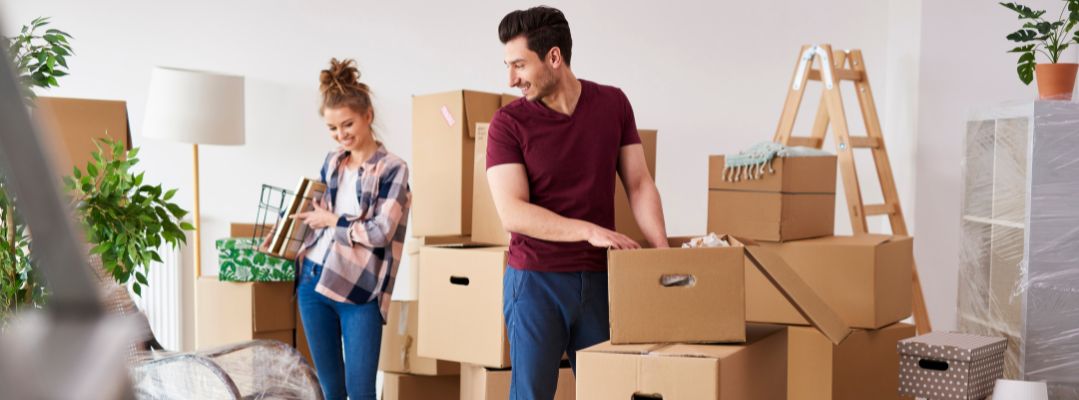10 Tips To Unpack Efficiently After Moving: Guide

Moving is already tough enough without adding the burden of unpacking your belongings. However, this experience may differ from person to person, as for some people, unpacking may feel like a fun process full of possibilities. Your packed boxes are likely to get set aside and forgotten about later. If you’ve ever moved residences, you’re certainly familiar with queries like, “Where did I put that?” or “Has anyone seen my stuff?” etc. Nobody can genuinely plan to unpack all of their belongings in a single day. Unpacking is all about having a strategic plan and system.
In this blog, we’ll provide you with some tips on how to unpack your belongings effectively after moving. These suggestions will make sure that you can organise your new home quickly and easily without any hassle.
1. Unpack With A System
Don’t just unpack the boxes randomly; instead, strategize your unpacking process in advance so that you know what items you are unpacking first. A copy of the inventory list should be in your possession. Prioritising the boxes containing the products you use on a daily basis is highly recommended. You can also make use of the moving checklist if you have made one at the time of packing your belongings to help you locate your possessions. Randomly opening the boxes will just increase the chaos and the amount of work required to unpack your belongings. So, make sure you establish a schedule that includes the tasks linked to unpacking, just as you did when you prepared a packing checklist. This schedule will help you manage the unpacking process better.
2. Start With The Necessities

Next, begin by unpacking the boxes that contain essential items you’ll need immediately. This includes toiletries, a change of clothes, basic kitchen supplies, important documents, your computer, a phone charger, and any medications. There are a lot of essential items that you need to keep your home running in that short period of time until you unpack all your belongings. Make sure you label all the boxes at the time of packing your stuff so that you will be able to recognise the box that consists of all the necessary items that you need during that short period of time. However, if you didn’t designate a box or two for the essentials, quickly search for the boxes that contain whatever you need to get by for at least a couple of nights.
3. Focus On One Room At A Time
Instead of piling the boxes in one specific area, it will be a good idea to bring each box to its designated area. Take each box to its designated room, as this will allow you to easily access the boxes and the items they contain. This will also allow you to stay organised and focused on one area at a time. Once you have done bringing the boxes to their designated room, concentrate on unpacking one room before moving on to the next. This method helps prevent you from feeling overwhelmed and will ensure that each area is properly set up. Because some people try to do so much at once, it will be difficult for them to organise everything in the end.
4. Use The Colour-coding Box Method
If you are familiar with the terminology for labelling moving boxes, you would have marked your boxes for the purpose of distinction when you were packing. Similar to labelling, you can also use colour coding to distinguish between the boxes and the types of items they contain. If you packed using a colour-coded method, for instance, use the same colours to identify the rooms in your new house. This method will make it easier to match the boxes to their intended locations. This colour-coding technique will not only save you time and hassle but also a great deal of it. Additionally, labelling your moving boxes with colours is not difficult to do, but it can simplify and speed up the process of unpacking.
5. Take Help From A Family Member

If you are moving with the family, you can distribute the task of unpacking among family members. You can let each of your family members unpack their room’s belongings and if you are moving alone, you can get help from your friends. The assistance of family members or friends will not only speed up the process but also make it more enjoyable. Children particularly benefit from this because it gives them a sense of involvement and makes them excited to unpack their own possessions. As a result, everyone in the household should be responsible for unpacking their possessions and placing them in locations where they can be easily found.
6. Start With The Kitchen
Eating is necessary so when you are unpacking your stuff, start with your kitchen essentials. If you have properly labelled the boxes, you should be able to locate what you need without the hassle of searching for it. The kitchen is the central area where daily meals are prepared, so having it set up promptly can help the transition go more smoothly. However, if you don’t have enough time to fully set up the kitchen, unpack only what you’ll need to cook for a few days until the rest of your belongings are unpacked. Don’t unpack large appliances first, instead, start by plugging in the smaller ones, like a toaster or coffee maker, to make things a bit easier. You return to organising the rest of the kitchen area once you have finished unpacking all of your belongings.
7. Set The Bedrooms

Once you are done with the kitchen, set up the bedrooms. Assemble beds, arrange bedding, and unpack linens. This creates a comfortable space to rest after a day of unpacking. If you thought ahead and kept aside the set of linens for each bed during the packing process, preparing the beds for a peaceful night should be an easier task. Additionally, when you get the time, determine the arrangement of furniture and organise the closets before going into unpacking other boxed items. Prioritising the installation of shelves and wardrobe organisation in advance will improve the effectiveness of the unpacking procedure and further reduce the workload in the days to come.
8. Arrange The Bathroom

Once you have arrived at your new home, you will want to rinse off the dirt and sweat from the moving and unpacking of your belongings. It is important to unpack toiletries, towels, and other bathroom essentials and set up the bathroom to ensure it’s ready to use. By making sure that your bathroom is set up from the beginning, you can begin continuing your personal care habits without disruption. Having a functional and organised bathroom is essential for everyone’s comfort. You will be at ease knowing that your bathroom is ready to use with all the necessary things, which will make the further unpacking process seamless.
9. Assemble The Furniture
Once you are done with all the necessary unpacking tasks, it is time to assemble and arrange the furniture throughout the house. This not only distributes the workload but also provides an opportunity for family members to contribute their ideas to the overall layout. It will be a good idea to create a thorough plan if you have to assemble and arrange the furniture in the bedrooms, living room, or dining room so that you only have to do it once. While unpacking furniture items, it is preferable to put together small pieces of furniture first that do not require assembling. On the other hand, larger furniture items that need to be assembled with tools, such as TV stands and bookshelves, only need to be put together once you have determined where they will go. So, before you begin constructing the large furniture pieces, take your time to plan everything out.
10. Unpack The Least Crucial Items Last
As you continue with the unpacking process, you will come across the items that are least crucial. It will be recommended that you unpack these boxes at last. The idea behind unpacking the least crucial items is to ensure that your immediate living needs are met before you start focusing on the less necessary things. For instance, only you can begin unpacking objects that may be seasonal or less commonly used once the kitchen, bedrooms, and bathroom have been set up. Don’t forget to unpack any supplies and tools you’ll need to keep your house operational, such as storage containers, appliances, other essentials, etc.
Conclusion
Unpacking after moving can be a really easy task if done with proper planning and a system. These above-mentioned tips will surely make your unpacking experience hassle-free. Make sure you get your essentials unpacked first before moving on to the rest of the house. As you have unpacked the boxes, flatten them and stack them neatly. This will assist you in reducing the area’s clustering and give you much more room to store your other belongings. Additionally, you can also take the help of a removalist company to unpack your stuff after moving if your budget allows it.
When it comes to finding a trustworthy and skilled professional removalist to assist you in unpacking your precious belongings, look no further than Harry The Mover. With years of experience, Harry The Mover brings a level of expertise that sets us apart in the moving industry. Harry The Mover understands that unpacking can be just as crucial as the packing itself, which is why we offer professional handling to unpack your possessions. We offer a range of services, including residential and commercial move, man and van, and packing and unpacking service, etc. Contact us today at 1800 318 026 for all your moving needs.




